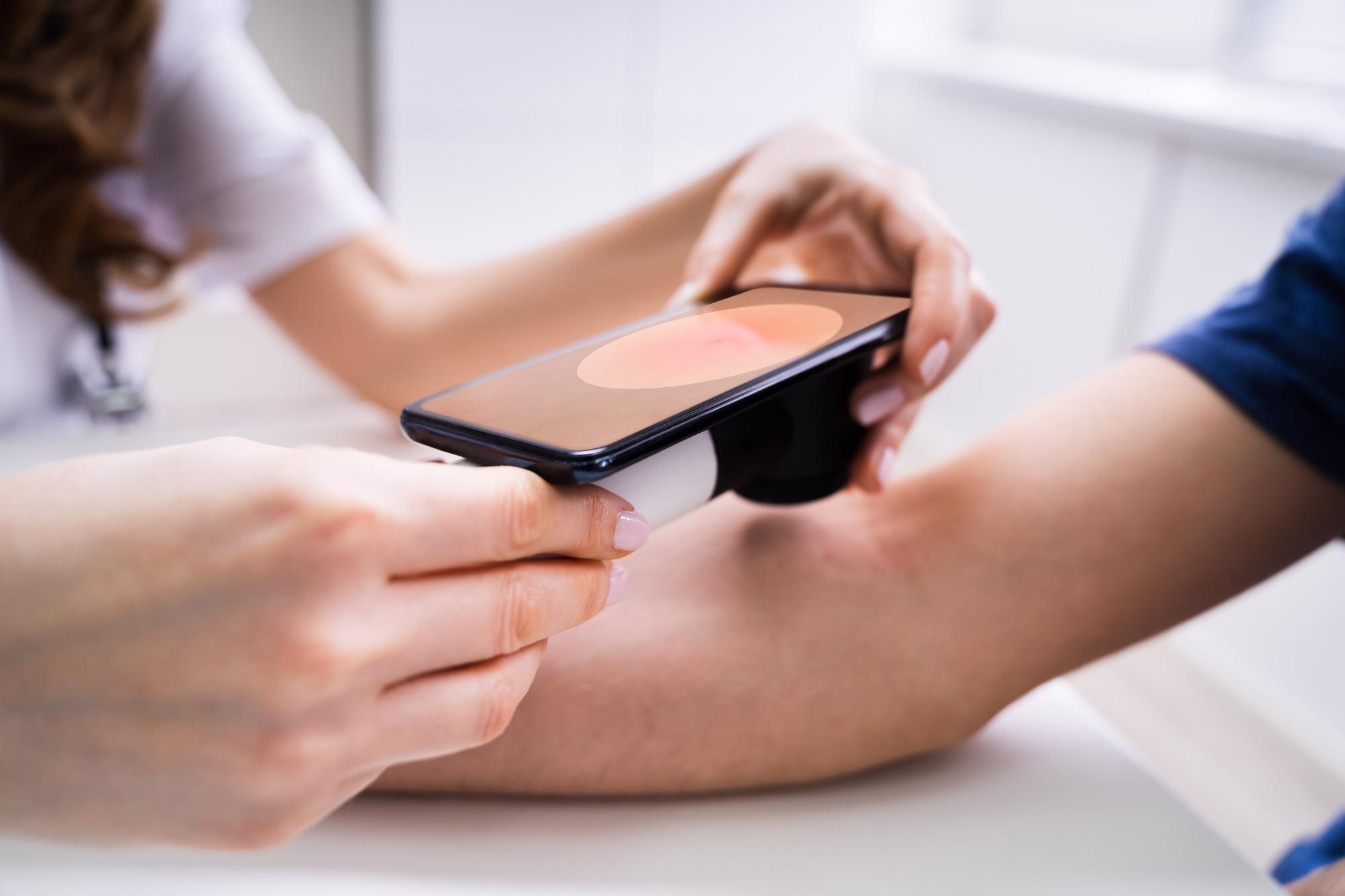
Image Credit: Shutterstock.com / Andrey_Popov
Google’s new Dermatology Assist app identifies skin and nail conditions prompting users to seek a professional medical diagnosis.
Skin conditions affect around 1.9 billion people, and a shortfall of dermatologists means that often conditions have to be diagnosed and treated by general practitioners who may not always be best equipped to identify such conditions.
Help could be at hand, enabling members of the general public to self-identify skin and nail conditions, prompting them to seek specialized medical treatment. Google has announced an AI tool named Dermatology Assist designed to help users potentially spot dermatological conditions based upon images they upload themselves.
The system — which was described as a ‘dermatology assist tool’ — was announced at Google’s I/O Google conference on Tuesday. The technology giant has said that the AI — described by researchers who worked on it as a deep learning system (DLS) — can recognize around 290 skin conditions, but caution that it is not a substitute for a medical diagnosis and should not be used as such.
Google’s desire to create a skin-condition identification system seems to have arisen from the fact that there are over 10 billion searches for skin conditions and other related issues across their search engine each year. The tool certainly reflects the I/O Google conference’s keynote speech — delivered online this year — which emphasized the mantra ‘building a more helpful Google.’
Google’s AI team stated, “We developed and fine-tuned our model with de-identified data encompassing around 65,000 images and case data of diagnosed skin conditions, millions of curated skin concern images, and thousands of examples of healthy skin — all across different demographics.”
The system is backed by three years of research documented in a paper published in the journal Nature Medicine¹.
A New Dermatology Assist Tool to Assist GPs
To test the dermatology assist tool and the DLS that serves as its foundation, researchers — including David Coz and Carter Dunn from Google Healthcare — trained the system with over 65,000 images.
They also put the AI through its paces against millions of curated images, thousands of examples of healthy skin, and case data from a wealth of diagnosed skin conditions.
The authors of the Nature study report that the DLS could distinguish between 26 common skin conditions, which account for 80 percent of cases seen in primary care. Additionally, the system was able to provide a secondary prediction on 419 dermatological conditions.
The team found the DLS performed as well as six dermatologists and better than several primary care physicians, added that this means it has great potential to assist GPs in diagnosing skin conditions.
Identification Not Diagnosis
Whilst scientists such as Tim Underwood, the head of cancer sciences at the University of Southampton, were impressed with Dermatology Assist, other doctors urged some caution regarding the system.
Roxana Daneshjou, a dermatology resident at Stanford School of Medicine, expressed some of her concerns on Twitter. Daneshjou pointed to the need for a clinical trial with real cases and patients as well as laboratory testing to assess the system’s true potential.
We have no prospective clinical trial in a clinical setting. The one ‘trial’ they reference uses the test set images from the Nature Medicine paper — we know the algorithm will perform well. We aren’t seeing a performance on a new external dataset.
Roxana Daneshjou, Dermatology Resident, Stanford School of Medicine
She also pointed out that despite Google’s statement that they had built the app for everyone, claiming that the system will account for factors such as age and race, certain skin types were underrepresented in the study. In fact, Daneshjou says that there were skin types that were omitted from the trial altogether.
“If something is being publicly launched, we should know how it performs across skin tones,” the dermatologist added. “Note there is 0% Fitzpatrick skin type VI [a skin color associated with African descent] in the test set of the original paper. That’s the darkest skin tone.”
The system devised by Google is also yet to receive clearance by the US Food and Drug Administration (FDA), but its creators will be buoyed by a similar AI-based diagnosis tool — designed to assist in lung cancer diagnosis — was recently approved by the FDA.
For now, Google is cautious too, saying that even if Dermatology Assist meets further testing and is granted FDA approval, it still won’t be a replacement for a trip to the dermatologist.
References
1. Coz. D., Dunn. R. C., Liu. Y., Jain. A., Eng. C., et al, [2021], ‘A deep learning system for differential diagnosis of skin diseases,’ Nature Medicine, [https://doi.org/10.1038/s41591-020-0842-3]
Disclaimer: The views expressed here are those of the author expressed in their private capacity and do not necessarily represent the views of AZoM.com Limited T/A AZoNetwork the owner and operator of this website. This disclaimer forms part of the Terms and conditions of use of this website.